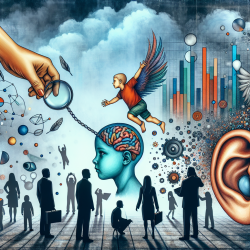Introduction
As a practitioner in the field of speech-language pathology, staying informed about the latest research is crucial for enhancing your skills and improving outcomes for children. A recent study titled "Defects in syntabulin-mediated synaptic cargo transport associate with autism-like synaptic dysfunction and social behavioral traits" offers groundbreaking insights into the synaptic mechanisms underlying autism spectrum disorders (ASDs).
Understanding the Research
The study explores the role of syntabulin, a kinesin-1 motor adaptor, in the transport of presynaptic cargos. It highlights how defects in syntabulin-mediated transport can lead to reduced synapse formation and maturation, contributing to autism-like synaptic dysfunction and behavioral abnormalities. This research provides a mechanistic link between impaired synaptic transport and ASD-related traits, such as defective social recognition and communication.
Key Findings
- Defects in syntabulin-mediated transport result in reduced synapse density and altered synaptic transmission.
- Conditional syntabulin knockout (stb cKO) mice exhibit autism-like traits, including impaired social behaviors and communication.
- The human missense variant STB-R178Q, found in an autism patient, fails to rescue synaptic dysfunction in stb cKO neurons.
Implications for Practitioners
Understanding the synaptic mechanisms underlying autism can guide practitioners in developing targeted interventions. By focusing on enhancing synaptic transport and function, practitioners can potentially improve social communication and behavioral outcomes for children with autism.
Encouraging Further Research
This study underscores the importance of further research into synaptic transport mechanisms and their role in neurodevelopmental disorders. Practitioners are encouraged to stay updated on emerging research and consider collaborative efforts with neuroscientists to explore innovative therapeutic approaches.
Conclusion
The findings from this study offer valuable insights into the synaptic dysfunctions associated with autism and highlight the potential for targeted interventions. By integrating these insights into practice, practitioners can enhance their ability to support children with autism effectively.
To read the original research paper, please follow this link: Defects in syntabulin-mediated synaptic cargo transport associate with autism-like synaptic dysfunction and social behavioral traits.










